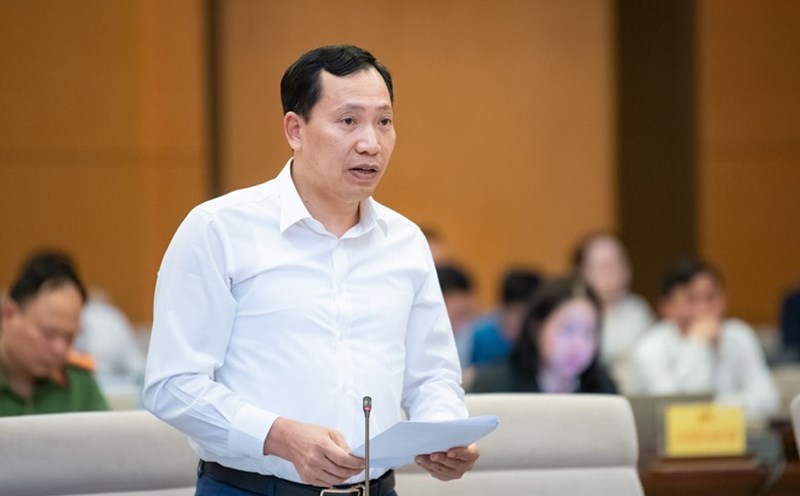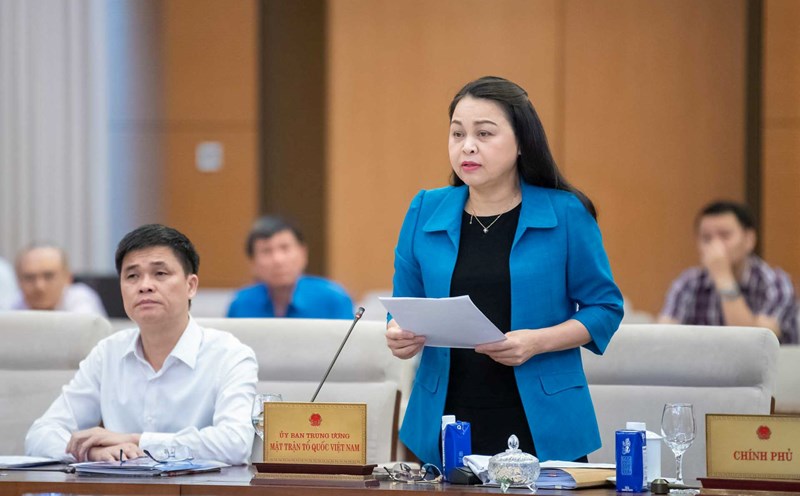On April 28, continuing the 44th session, the National Assembly Standing Committee gave opinions on the draft Law amending and supplementing a number of articles of the Criminal Procedure Code.
Presenting the draft law, Director of the Supreme People's Procuracy (SPP) Nguyen Huy Tien said that the development of this draft law is determined to amend and supplement a number of articles on the names, authority, tasks and powers of competent agencies and individuals conducting criminal proceedings.
Along with that, promptly institutionalize the conclusions of the Politburo and the requirements of competent authorities to resolve urgent issues arising from practice related to the order and procedures for execution of the death sentence, investigation and prosecution procedures in absentia.
Mr. Nguyen Huy Tien said that in reality, there have been many particularly serious cases, causing great damage, but the accused have fled or are wanted without results; or the accused abroad cannot be summoned.
The prosecution agency has sufficient grounds to prove the crime and issue investigation conclusions, propose prosecution/accusation of the accused but still has to decide to temporarily suspend the investigation/temporarily suspend the case without being able to handle it in absentia.
This greatly affects the timely settlement of the case, handling of other defendants in the case, and the recovery of assets.
The new Criminal Procedure Code only has provisions on litigation in absentia in Article 290, and there are no specific regulations on this order and procedure during the investigation and prosecution period.
To solve this problem, the Supreme People's Procuracy believes that it is necessary to develop guidelines for investigation, prosecution, and trial in the absence of defendants and defendants in cases where there is sufficient evidence to resolve the case. This regulation ensures the strictness of the law, deterring criminals who intend to flee.
In fact, the prosecution agency has coordinated, conducted investigations, prosecuted, and tried many defendants in large cases, recovered many assets of great value, and received public approval and support.
Including prosecution, investigation, prosecution, and trial in absentia against Nguyen Thi Thanh Nhan and a number of others in the AIC Dong Nai case. Some people after fleeing returned to surrender and accepted to serve the judgment and decision of the Court, without complaints, denunciations, or appeals.
To institutionalize the above requirements, there is a specific legal basis, it is necessary to immediately supplement the basis and cases of investigation and prosecution that are absent from the amendment and supplementation of the Criminal Procedure Code this time.
Accordingly, the investigating agency may conclude that the investigation proposes to prosecute the accused/procuracies may decide to prosecute the accused when there is sufficient grounds and ensure the right to defend the accused in accordance with this Code in the case of: The accused flee and the wanted notice has no results; The accused is overseas that cannot be summoned to serve investigating activities or serving activities to determine the prosecution.
At the same time, the bill assigned the Director of the Supreme People's Procuracy, the Minister of Public Security shall assume the prime responsibility and coordinate with the Minister of Defense and the Chief Justice of the Supreme People's Court detailing and guiding the implementation of these regulations.
Regarding procedures for investigation and prosecution in case the accused is absent, presenting the verification report, the Chairman of the Legal and Justice Committee Hoang Thanh Tung said that the Committee found that the practice occurred many particularly serious cases, causing great damage to the property of the State, agencies, organizations and individuals.
Therefore, the draft law supplements the regulation that the Investigation Agency for the Investigation Conclusion Proposal for Prosecution/the Procuracy decides to prosecute the accused in the two above-mentioned cases as appropriate.
Regarding the procedure for considering the death penalty before implementation, the competent agency basically agreed with the Draft Law, and proposed the Supreme People's Procuracy to continue reviewing to ensure strict regulations on procedures for considering the death penalty before implementation.








